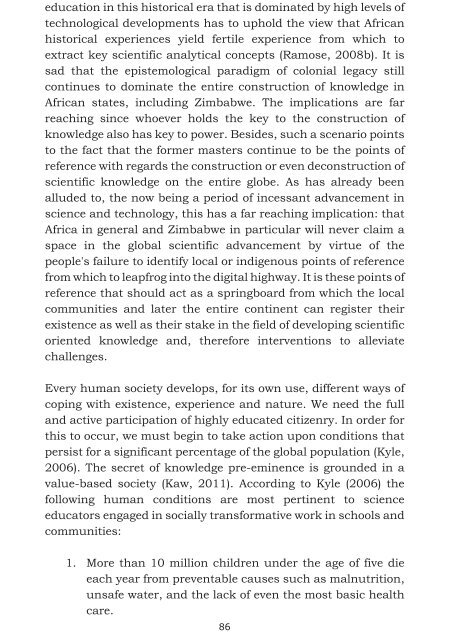Beneficiaries are actors too.pdf - Southern Institute of Peace ...
Beneficiaries are actors too.pdf - Southern Institute of Peace ...
Beneficiaries are actors too.pdf - Southern Institute of Peace ...
Create successful ePaper yourself
Turn your PDF publications into a flip-book with our unique Google optimized e-Paper software.
education in this historical era that is dominated by high levels <strong>of</strong><br />
technological developments has to uphold the view that African<br />
historical experiences yield fertile experience from which to<br />
extract key scientific analytical concepts (Ramose, 2008b). It is<br />
sad that the epistemological paradigm <strong>of</strong> colonial legacy still<br />
continues to dominate the entire construction <strong>of</strong> knowledge in<br />
African states, including Zimbabwe. The implications <strong>are</strong> far<br />
reaching since whoever holds the key to the construction <strong>of</strong><br />
knowledge also has key to power. Besides, such a scenario points<br />
to the fact that the former masters continue to be the points <strong>of</strong><br />
reference with regards the construction or even deconstruction <strong>of</strong><br />
scientific knowledge on the entire globe. As has already been<br />
alluded to, the now being a period <strong>of</strong> incessant advancement in<br />
science and technology, this has a far reaching implication: that<br />
Africa in general and Zimbabwe in particular will never claim a<br />
space in the global scientific advancement by virtue <strong>of</strong> the<br />
people's failure to identify local or indigenous points <strong>of</strong> reference<br />
from which to leapfrog into the digital highway. It is these points <strong>of</strong><br />
reference that should act as a springboard from which the local<br />
communities and later the entire continent can register their<br />
existence as well as their stake in the field <strong>of</strong> developing scientific<br />
oriented knowledge and, therefore interventions to alleviate<br />
challenges.<br />
Every human society develops, for its own use, different ways <strong>of</strong><br />
coping with existence, experience and nature. We need the full<br />
and active participation <strong>of</strong> highly educated citizenry. In order for<br />
this to occur, we must begin to take action upon conditions that<br />
persist for a significant percentage <strong>of</strong> the global population (Kyle,<br />
2006). The secret <strong>of</strong> knowledge pre-eminence is grounded in a<br />
value-based society (Kaw, 2011). According to Kyle (2006) the<br />
following human conditions <strong>are</strong> most pertinent to science<br />
educators engaged in socially transformative work in schools and<br />
communities:<br />
1. More than 10 million children under the age <strong>of</strong> five die<br />
each year from preventable causes such as malnutrition,<br />
unsafe water, and the lack <strong>of</strong> even the most basic health<br />
c<strong>are</strong>.<br />
86


